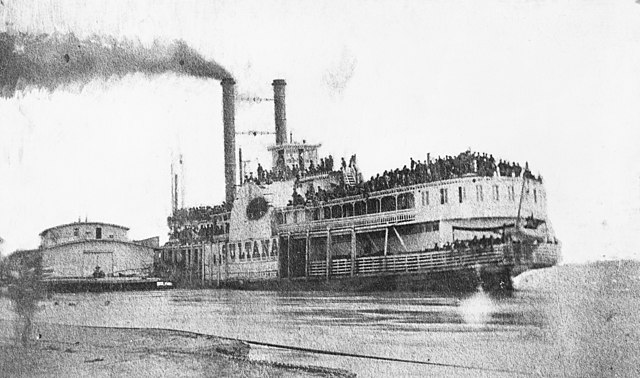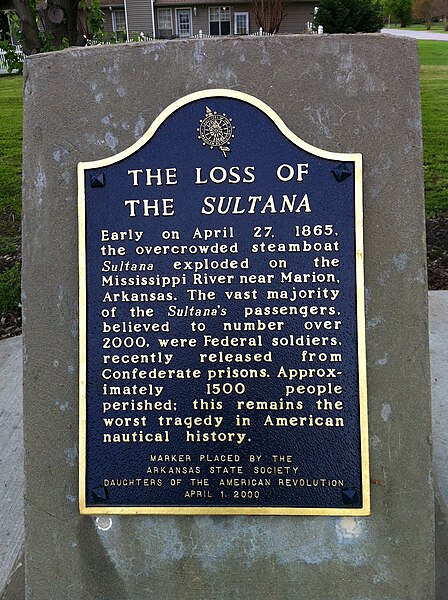|
Posted: 4/27/2014 8:18:20 PM EDT
April, 1865-- the US Civil War is coming to a close and Union POWs are being released from Confederate prisoner of war camps at Andersonville and Cahaba. Approximately 5500 ex-POWs were sent to Camp Fisk, at Vicksburg, Mississippi, to be returned to Union control.
The SS Sultana, a river steamboat, and her captain, J. Cass Mason, enter the scene here after traveling upriver from New Orleans with a load of passengers.
"Built in Cincinnati, Ohio, in early 1863 for Captain Preston Lodwick, the 260-foot-long Sultana was reported to be 'one of the largest and best steamers ever constructed.' With a legal carrying capacity of 376, the Sultana, which had a crew of eighty to eighty-five, was permitted to take on only about 290 passengers. Lodwick owned the Sultana until March 1864, when he sold her to three investors, one of whom was J. Cass Mason, the steamer's captain and master. However, to off-set his financial problems, Mason had, by mid-April of 1865, sold most of his interest in the Sultana to his first clerk, William J. Gambrel and others.
After the Sultana docked at Vicksburg, Mason went into town on a quest for passengers for his boat's return trip. General Dana, the Union Commander for the Department of the Mississippi, had ordered that the soon-to-be paroled prisoners at Camp Fisk be sent northward from Vicksburg on privately owned steamboats, with the vessels' owners receiving five dollars per enlisted man carried and ten dollars for each officer.
Mason, in an effort to get as many of these soldiers as possible for his upriver trip, met with two army officers — Brigadier General Morgan L. Smith and Lieutenant Colonel Reuben B. Hatch — while the Sultana was stopped at Vicksburg. Because Smith, commander of the post and the District of Vicksburg, was, like Mason, from St. Louis and had been a riverboat captain for several years prior to the war, the two may have been acquainted. In any event, Smith promised Mason a full load of soldiers for his upriver journey.
Mason got a similar promise from Hatch, the chief quartermaster for the Department of the Mississippi and a man whose military record was tarnished by evidence of corruption. Early in the war, while serving as an assistant quartermaster at Cairo, Illinois, Hatch had been arrested for taking bribes in the purchase of military supplies. The evidence of his guilt was overwhelming, but thanks to his brother, O. M. Hatch — the secretary of state for Illinois and a friend and financial supporter of President Lincoln — Reuben Hatch never appeared before the court-martial tribunal that had been ordered to try him. O. M. Hatch, along with Illinois Governor Richard Yates and Jesse K. Dubois, the state auditor, wrote to Lincoln proclaiming Reuben Hatch's innocence and seeking the president's aid."
http://www.historynet.com/sultana-a-tragic-postscript-to-the-civil-war.htm
SS Sultana, near Helena, Arkansas with load of ex-POWs:
 Unfortunately, Captain Mason had bad mechanical issues aboard the Sultana. One of Sultana's boilers had developed a leak which should have required a complete replacement of that boiler. Fearing that the delay to get proper repairs done would let other steamboats take his promised passengers, Captain Mason opted to have the boiler patched with a temporary repair.
Unfortunately, Captain Mason had bad mechanical issues aboard the Sultana. One of Sultana's boilers had developed a leak which should have required a complete replacement of that boiler. Fearing that the delay to get proper repairs done would let other steamboats take his promised passengers, Captain Mason opted to have the boiler patched with a temporary repair.
Meanwhile, Captain Mason's quartermaster department friends kept their promise, and stuffed his ship well beyond its maximum limits, even letting other ships depart Vicksburg empty, or with less than 20 passengers. The junior officers, Army Captains Williams and Speed, let numerous trainloads of ex-POWs board the Sultana, without an accurate count or any semblance of a manifest.
"The confidence that Williams and Speed had in the ability of the Sultana to carry all the remaining prisoners was not shared by Captain William F. Kerns, the quartermaster in charge of river transportation. Kerns had tried in vain to convince Speed to place some of the men on the Lady Gay, a steamboat then docked at Vicksburg that was larger than the Sultana. Speed, refusing to divide the prisoners, continued to maintain that they all could travel on the one vessel. The Lady Gay, therefore, headed north from Vicksburg without a single paroled prisoner on board.
A few minutes after the departure of the Lady Gay, Captain Williams and the first trainload of former prisoners — an estimated 570 — pulled into Vicksburg. These men joined 398 soldiers already on board the Sultana, who probably came from the military hospital. Thus, the Sultana then exceeded her carrying capacity by more than six hundred.
As the day wore on, two more trainloads of men boarded the Sultana. Captain Williams, whose responsibility was to count the soldiers as they went aboard the steamer, was not at the dock when the second group of men walked across the Sultana's gangplank. Consequently, four hundred soldiers were not added to his tally.
After this second load of soldiers boarded the Sultana, Captain Kerns warned Colonel Hatch that too many prisoners were being placed on the one steamer and tried to have some men sent north on the recently arrived Pauline Carroll. Hatch sent a telegram to Speed at the parole camp asking if there were more prisoners than could go aboard the Sultana. Speed, still convinced that there were no more than a total of 1,400 to be shipped that day, replied: '[No,] they can all go on one boat.' With that assurance, Hatch refused to divide the men between the two vessels.
Equally certain that his assessment was correct, Captain Kerns approached General Smith, pleading with him to 'interpose his influence and have part of the prisoners go on the Pauline Carroll.' Smith, like Hatch, did nothing.
The third and final train arrived at the riverfront late on the afternoon of April 24, carrying approximately eight hundred paroled prisoners. As the long column of soldiers from the train snaked toward the Sultana, Captain Kerns once again implored Speed, who had ridden into Vicksburg on the train, and Williams to reconsider and place some of the men on the Pauline Carroll, which was still docked beside the Sultana. Both officers refused Kerns's request. Williams, who had been aboard the Sultana, declared that there was plenty of room on her decks for the men to be comfortable. A little while later, Kerns watched in dismay as the Pauline Carroll steamed away from Vicksburg with a total of 17 passengers."
http://www.historynet.com/sultana-a-tragic-postscript-to-the-civil-war.htm
The Sultana left Vicksburg with up to 2100 soldiers on board. No one ever got an accurate count. It traveled up river safely until passing Memphis, when early in the morning of April 27th, the Sultana blew up. More than 1700 soldiers died in the ensuing explosion, fire, and suddenly being thrown into the 4 mile wide Mississippi River to drown.
Sultana disaster, from Harper's Weekly:
 "The official cause of the Sultana disaster was determined to be mismanagement of water levels in the boiler, exacerbated by the fact that it was severely overcrowded and top heavy. As the steamship made her way north following the twists and turns of the river, she listed severely to one side then the other. Her four boilers were interconnected and mounted side-by-side, so that if the ship tipped sideways, water would tend to run out of the highest boiler. With the fires still going against the empty boiler, this created hot spots. When the ship tipped the other way, water rushing back into the empty boiler would hit the hot spots and flash instantly to steam, creating a sudden surge in pressure. This effect of careening could have been minimized by maintaining high water levels in the boilers. The official inquiry found that the ship's boilers exploded due to the combined effects of careening, low water level, and a faulty repair to a leaky boiler made a few days earlier."
http://en.wikipedia.org/wiki/SS_Sultana
"The official cause of the Sultana disaster was determined to be mismanagement of water levels in the boiler, exacerbated by the fact that it was severely overcrowded and top heavy. As the steamship made her way north following the twists and turns of the river, she listed severely to one side then the other. Her four boilers were interconnected and mounted side-by-side, so that if the ship tipped sideways, water would tend to run out of the highest boiler. With the fires still going against the empty boiler, this created hot spots. When the ship tipped the other way, water rushing back into the empty boiler would hit the hot spots and flash instantly to steam, creating a sudden surge in pressure. This effect of careening could have been minimized by maintaining high water levels in the boilers. The official inquiry found that the ship's boilers exploded due to the combined effects of careening, low water level, and a faulty repair to a leaky boiler made a few days earlier."
http://en.wikipedia.org/wiki/SS_Sultana

|
 Win a FREE Membership!
Win a FREE Membership!